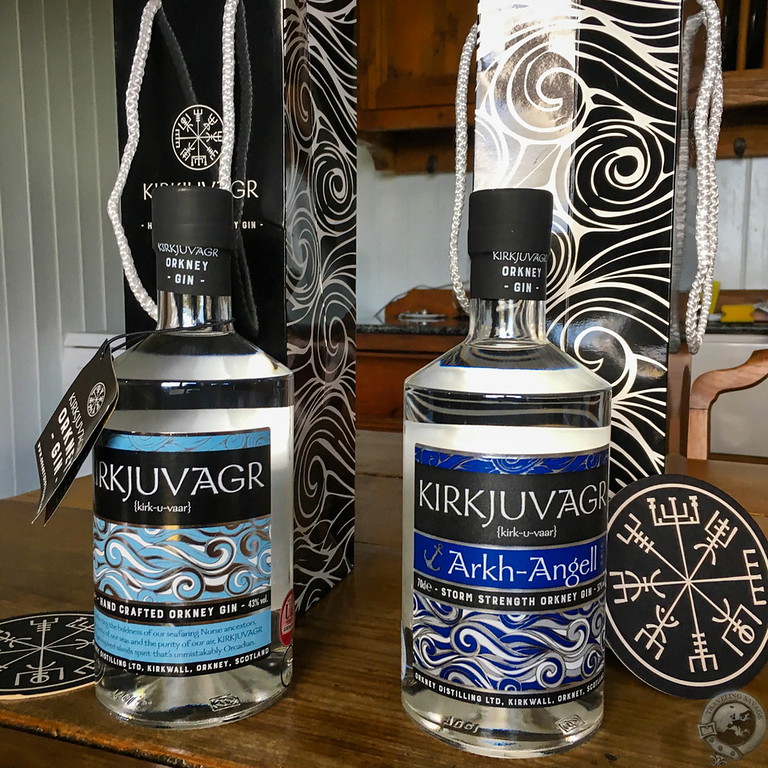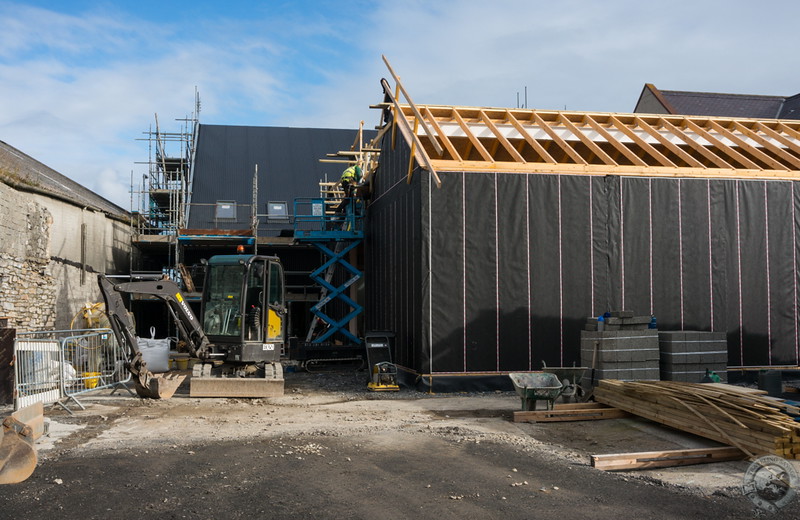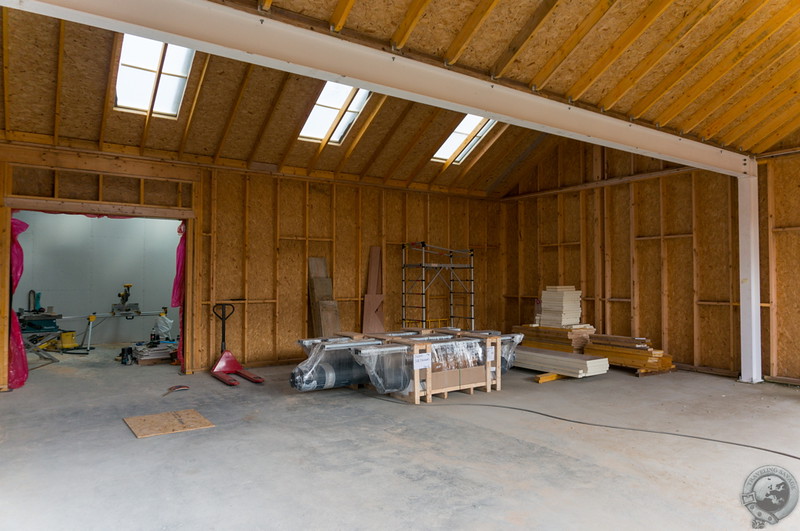Long ago, the vikings sailed the seas by line of sight, naming land masses, bays, and promontories by their physical appearance so that anyone could navigate the wild oceans to distant lands. In Orkney, a land with deep Norse roots, this system is readily apparent the moment you peer at a map of that northern Scottish archipelago: Deerness (a deer-shaped headland), Hamnavoe (safe harbor), and Kirkwall (church bay) appear amongst many other names. Such is the tale Stephen Kemp, founder of The Orkney Distillery, told me as we explored The Orkney Distillery’s construction site along the Bay of Kirkwall.
I caught wind of The Orkney Distillery earlier this year during my stint working at Strathearn Distillery in Perthshire. The Orkney Distillery had contracted Strathearn to make their excellent Kirkjuvagr (pronounced kirk-u-vaar) Orkney Gin while the distillery was under construction, and I had the opportunity to make Kirkjuvagr during the whisky school. I knew I’d be heading to Orkney in the fall, and it only made sense to reach out to Stephen and arrange a visit to the work-in-progress distillery while I was there.
A beautiful September morning dawned in Kirkwall the day I walked to The Orkney Distillery construction site overlooking the bay. Stephen greeted me with a friendly smile, strong handshake, and a safety vest and helmet. He’s a builder first and foremost, the man behind Orkney Builders, the archipelago’s leading building contractor, whose Orcadian lineage stretches back generations. I donned the safety gear as we began chatting on the edge of the construction site as small backhoes, bobcats, and a contingent of construction workers busily brought the The Orkney Distillery into existence. I figured I might have fifteen minutes of Stephen’s time, but he generously afforded me two hours to learn about the vision and future of the distillery.
When you envision the founding of a new distillery in Scotland, you might not think of someone outside the spirits industry, but it happens a lot more often than you’d think. Spirits are a passion for many people, and getting into distilling is a realistic endeavor if you’ve got a mind for business. After just a few short minutes my intuition kicked in to tell me Stephen is exactly this type of person. Growing up in Orkney and helming a business integral to the islands, Stephen is woven into the communal fabric of Orkney. When thrice weekly rugby matches turned out to be a questionable long-term hobby, Stephen found a new hobby: Starting a distillery.
Pulling the trigger on a project outside your knowledge base is never easy. I’ve been there. Using his business acumen and local contacts, Stephen created a team to build a robust brand long before production, wisdom I’d heard from Strathearn’s Tony Reeman-Clark earlier in the year. The gin market in Scotland has exploded over the last five years with well over 100 gin distilleries cropping up across the highlands and islands. It seems like a bubble to many, but in Stephen’s estimation brands established within the next 3-5 years will survive whatever crash may come. So the story of The Orkney Distillery existed before there was an actual product, which makes perfect sense. After all, you don’t build a house before developing the blueprints. It’s hard to argue with the tack he has chosen for their flagship product, Kirkjuvagr gin: Telling the tale of Orkney’s history through local provenance and Norse-inspired marketing, like the viking compass, or Vegvisir, on the cork top.
While gin is a product of the British Empire — it wouldn’t be gin without many of the distinct botanicals sourced from the east, herbs and spices like cassia, coriander, and cardamom — many of the earthy and floral botanicals can be grown in Orkney. Working with the Agronomy Institute of the University of the Highlands and Islands, Stephen has sourced local Norse Angelica root, aronia, romanas rose, borage, and Orkney bere barley for his products. Given Stephen’s knowledge of the islands, spirits from The Orkney Distillery could even list specific farm fields from where their grains were grown.
Stephen led me into the construction site with tales of Kirkwall’s past. He pointed out where the old harbormaster’s house was located, where a river once flowed through the center of Kirkwall, and mentioned a dozen other historical snippets invisible to the average visitor, folklore gathered from a life on the islands working as a builder. His business bought the buildings that would later be demolished to make room for The Orkney Distillery a decade ago, unsure what to do with them at the time but confident in their perfect location along the harbor. They broke ground in April, and during my visit the distillery’s timber frame and high-quality materials were on display beneath the tarps and scaffolding.
The space is quite large with several warehouse-sized sections leading back from the street, despite the fact that Stephen intended to start with just a small production shed. Few would understand the building costs and realities better than the owner of a building company, and so Stephen enlarged his initial ideas for the distillery to dovetail with his vision of future growth. He led me through the space, painting a picture of the visitor experience as tours make their way past the stillhouse with its small copper stills producing Kirkjuvagr gin and actually walking me through a 3D version of the finished distillery on his phone.
Stephen’s vision of the visitor experience impressed me. The front of the distillery will be a hybrid shop and bar, a place where people could step in from the windy Kirkwall streets and have a drink or a coffee while sitting in plush chairs and watching the world go by through the plate glass windows. The space could be a comfortable, like-minded home to the local whisky club or become a high-end evening experience the likes of which you can only currently find in Glasgow and Edinburgh. Every year an increasing number of international cruisers disembark in Kirkwall for a brief taste of Orkney, and Stephen can see The Orkney Distillery being their gateway to the city. In fact, he has already designed the distillery tour for inclusion in cruise packages that take in the Orkney Islands.
There are many incredible gins on the market today, so many, in fact, that new distilleries are already peering into the next spirit about to explode (hint: It rhymes with mum). And yet young Kirkjuvagr stands among them buoyed by it’s focus on the islands’ Scandinavian heritage, hand-crafted modus operandi, and botanical provenance. A dram of Kirkjuvagr presents hints of fresh sea breezes, lemons, pine, spices, and a final floral flourish.
With a giant like Highland Park on Orkney’s mainland, opening a distillery here seems like a daunting task. Focusing on gin at the outset make sense on many fronts, from the competitive sphere to instant cash flow. And who knows what the future will bring for The Orkney Distillery, what spirits might drift in on the wind. The distillery aims to open for Easter 2018, and while you wait you can find Kirkjuvagr on store shelves now.
As the lunch hour neared and my visit of the construction site approached its conclusion I clearly saw Stephen’s vision for The Orkney Distillery: A producer of fine spirits, a destination in its own right, and a gateway to Kirkwall and the Orkney Islands.
I’m holding a bottle of Kirkjuvagr gin right now, looking at the back label. It states that the Vegvisir helped guide the Norsemen across the oceans, and that they hope it will lead us consumers on our own epic voyage to the discover the home of Kirkjuvagr. We’d be fools not to.
Disclosure: I arranged the visit to The Orkney Distillery’s construction site with Stephen Kemp. All thoughts and opinions expressed here, as always, are my own.






I am so inspired by people who take the leap to do something totally different. This seems to be the case for a lot of people in the craft distillery industry (and probably craft beverages overall). I’m hoping to make it to Scotland in the next year or so and would love to visit. Thanks for the insights.
Me too, Laura. Makes one wonder. Good luck getting to Scotland!